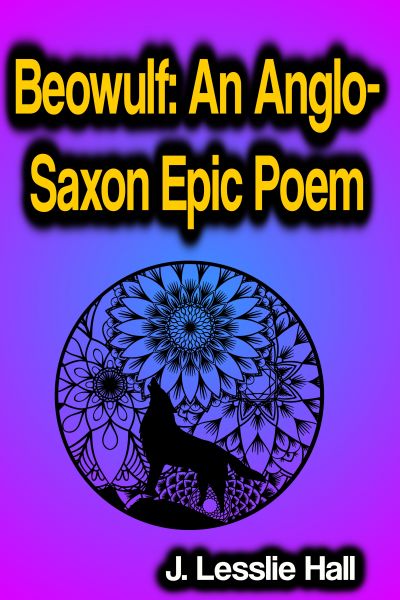Beowulf An Anglo-Saxon Epic Poem
Beowulf An Anglo-Saxon Epic Poem J. Lesslie Hall - Point out the place: he passed then unwillinglyTo the spot where he knew of the notable cavern, The cave under earth, not far from the ocean,The anger of eddies, which inward was full of Jewels and wires: a warden uncanny, Warrior weaponed, wardered the treasure, Old under earth; no easy possession For any of earth-folk access to get to. Then the battle-brave atheling sat on the naze-edge, While the gold-friend of Geatmen gracious saluted His fireside-companions: woe was his spirit, Death-boding, wavring; Weird very near him, Who must seize the old hero, his soul-treasure look for, Dragging aloof his life from his body: Not flesh-hidden long was the folk-leaders spirit. Beowulf spake, Ecgtheows son:It is the devout desire of this translator to hasten the day when the story of Beowulf shall be as familiar to English-speaking peoples as that of the Iliad. Beowulf is our first great epic. It is an epitomized history of the life of the Teutonic races. It brings vividly before us our forefathers of pre-Alfredian eras, in their love of war, of sea, and of adventure.My special thanks are due to Professors Francis A. March and James A. Harrison, for advice, sympathy, and assistance.
John Lesslie Hall (March 2, 1856 February 23, 1928), also known as J. Lesslie Hall, was an American literary scholar and poet known for his translation of Beowulf.Born in Richmond, Virginia, the son of Jacob Hall, Jr., Hall attended RandolphMacon College and received a PhD from Johns Hopkins University. He taught English history and literature at the College of William & Mary from 1888 to 1928 (becoming head of the English department and dean of the faculty, and receiving an honorary LLD in 1921); he "was one of the original members of the faculty which reopened the college in 1888".[1] He was also concerned with the history of his native Virginia; he frequently spoke at Jamestown and "compared Jamestown's Great Charter of 1618[clarification needed] and the assembly of 1619 with the Magna Charta at Runnymede."[2]In 1889 he married Margaret Fenwick Farland, of Tappahannock, Virginia.[3] Their children were Channing Moore Hall, John L. Hall Jr., Joseph Farland Hall, and Sarah Moore Hall
Versandkostenfreie Lieferung! (eBook-Download)
Als Sofort-Download verfügbar
- Artikel-Nr.: SW9783985946006110164
- Artikelnummer SW9783985946006110164
-
Autor
J. Lesslie Hall
- Wasserzeichen ja
- Verlag Phoemixx Classics Ebooks
- Seitenzahl 144
- Veröffentlichung 18.09.2021
- ISBN 9783985946006
- Wasserzeichen ja

